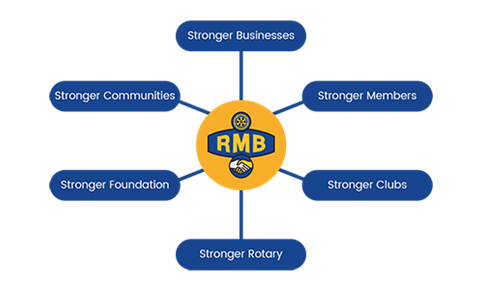
Professional networking has been part of Rotary since our earliest days. “Part of being Rotarians doing business with each other is that we assume we are all going to follow The Four- Way Test,” says Mark Burchill, a member of the Rotary Club of Santa Rosa, California. “So there’s a level of trust.”
Burchill is the chair of the Rotary Means Business Fellowship, which was established in 2013 to celebrate and encourage networking among members and between clubs. The fellowship has expanded to include more than 120 chapters, with many of the chapters covering an entire district.
Two of its biggest growth areas have been in India and South America. Nicolás Juan Cánepa Arigón, a member of the Rotary Club of Montevideo, Uruguay, and leader of the Uruguay chapter of Rotary Means Business, notes that several Latin American chapters have recently joined forces — “a great forum that will unite most of southern America, from Mexico to Argentina” — to promote the value of the fellowship to clubs in other countries.
“Rotary Means Business is attractive to younger members,” Burchill says. “A lot of the younger people whom Rotary is trying to attract don’t have a lot of extra time. If they can consolidate Rotary and business networking, they’re more likely to join a Rotary club.”
Rotary Means Business encourages members to support the success of their fellow Rotarians by doing business with them and referring others to them. Learn more at rotarymeansbusiness.org.
Recruitment Drives
“Having fellowship meetings open to both Rotarians and non-Rotarians has made it very easy to recruit new Rotary members. Once a nonmember attends and meets Rotarians — who tend to be ethical, helpful, courteous, upstanding, and successful businesspeople — they realize that these are the kind of people they want to associate with, and they soon ask: ‘How can I join Rotary?’ The fellowship is all about fostering business relationships within Rotary and in the community. I have seen this happen repeatedly over the years that I have led my chapter. It produces stronger local businesses, which leads to stronger Rotarians, then stronger clubs, which leads to a stronger Rotary and Rotary Foundation.” — Bill Fishman, Rotary Club of White Plains, New York
“We saw many non-Rotarians coming in as guests for our fellowship meetings, looking forward to introducing themselves and their business to our members. Very quickly they realized the potential and quality of members of this fellowship and wanted to be part of it. Many of our guests soon became members of one of the Rotary clubs in the district. Usually, they join the club of the Rotarian who invited them to the meeting initially.” — Rajamohan Dhandapani, Rotary Club of Coimbatore North, India
“A chapter was launched recently in India — RMB Rotaract Madurai — which is a purely Rotaract chapter. Another chapter that I know in India approaches many Rotaract entrepreneurs to become members of the fellowship, to encourage them to become full-time Rotarians in the near future.” — Sachin Gururaj, Rotary Club of Bangalore Oasis, India
Value Added
“For the presidents and committee chairs of Rotary clubs today, having a Rotary Means Business member in their club means having the keys to be able to execute anything that their members require or request. For every action that requires contacts, consulting a member of our group is bound to increase your impact.” — Nicolás Juan Cánepa Arigón
“I have seen fellowship members connect with other Rotarians with whom they can create service projects based on their professions and the gifts and talents they carry with them. Just one small comment during a conversation can set the momentum for future service projects and professional opportunities. Networking is building relationships based in integrity. These relationships are built in layers, and when given the opportunity to grow, they are beneficial to both Rotary and the individual club member. I believe that this was the thought process that our founder, Paul Harris, had back in 1905. He successfully combined professional networking with service and fellowship.” — Linda Kemp, Rotary Club of Aurora, Illinois
“In many clubs in South America, we realize that we often sit next to people, have dinner or lunch, and perform service projects. But we do not know what this person’s profession is. Why? I can’t say exactly. What we are doing in the fellowship is encouraging Rotarians to make professional connections — valuing the professional services of their peers, and especially providing references for their peers.” You can count on the Rotary Means Business team in your region to encourage the development of a fair and ethical professional network. Use our services — we are here to help!” — Leonardo Santos, Rotary E-Club de Motociclistas, Brazil

Extracted From An Article By Kris Vire